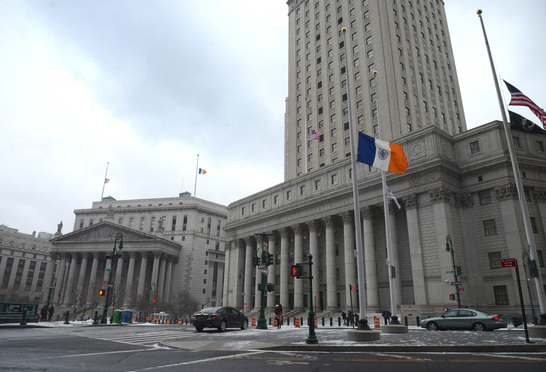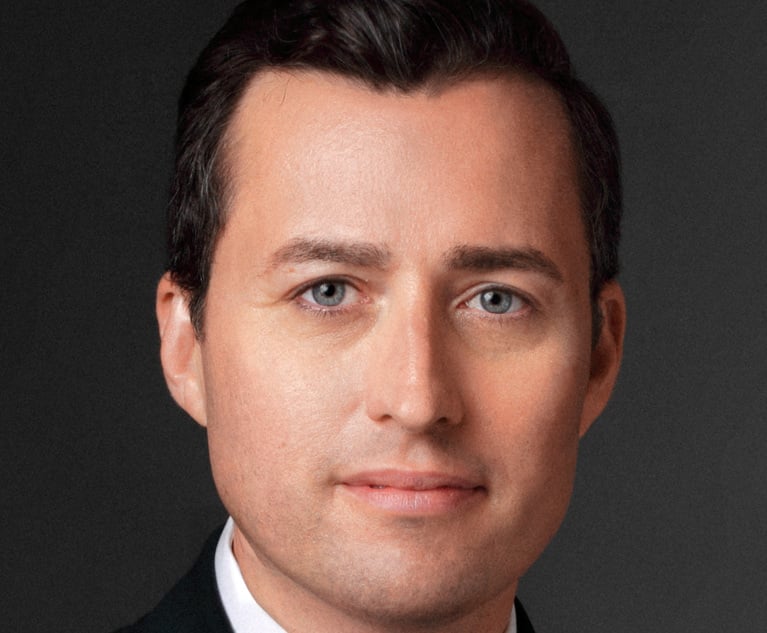Supreme Court Strikes Down NY Title Insurance Regulation
Justice Eileen Rakower issued a decision reversing the rule announced by the state Department of Financial Services in October 2017. The state plans to appeal the decision, DFS Superintendent Maria Vullo said.
July 06, 2018 at 03:24 PM
6 minute read
 Manhattan Supreme Court and the Thurgood Marshall U.S. Courthouse at Foley Square. Photo by Rick Kopstein/ALM A Manhattan Supreme Court justice on Thursday struck down a state regulation that barred title insurers from passing along marketing and client-relations expenses to customers. Justice Eileen Rakower issued a decision reversing the rule announced by the state Department of Financial Services in October 2017. The state plans to appeal the decision, DFS Superintendent Maria Vullo said. Rakower said in her decision that parts of the agency's regulation were “irrational” and could instead be addressed by the legislature rather than a state agency. The regulation was created to prevent title insurance companies from charging consumers for marketing expenses through premiums at closing. An investigation by the agency in 2015 found title insurance companies and agents spend millions each year marketing to attorneys and real estate agents. Those expenses, which could include meals, entertainment and other fees, were in turn billed to consumers in premiums as marketing costs. The DFS said in October that the practice violated a part of the state's insurance law that prohibits the exchange of a rebate, fee, or any “other consideration or valuable thing” as an inducement for business. The DFS argued marketing and entertainment expenses fall under the latter category. Rakower disagreed in Thursday's decision, saying that any “other consideration or valuable thing” is akin to a rebate or fee, not a marketing expense. “Indeed, 'rebate,' 'fee,' 'premium,' 'charge' and 'commission,' when construed together, indicated that the Legislature sought to remedy the mischief of kickbacks , not marketing expenses,” Rakower wrote. Rakower also pointed to the title of that section of law, which only lists commissions and rebates as prohibited, not marketing expenses. The legislature did not write the law to restrict the marketing practices of title insurance companies, she wrote. “To construe [the law] in this manner is to hold the Legislature intended to prohibit title insurance corporations from marketing themselves for business—and absurd proposition,” Rakower wrote. The title insurance companies are represented by Gibson, Dunn & Crutcher partner Mylan Denerstein, who previously served as Gov. Andrew Cuomo's chief counsel, as well as associates Akiva Shapiro and David Coon. “The court's thorough decision was very clear: these sweeping regulations exceeded the scope of DFS's statutory authority and should never have been adopted,” Denerstein said. “As Judge Rakower explained, the regulations are internally 'irreconcilable and irrational,' and the notion that the legislature intended to ban the industry's ordinary marketing activities is an 'absurd proposition.'” Rakower also annulled part of the regulation that prohibited in-house title insurance closers from accepting a gratuity or charging a pick-up fee during closing. But the regulation allowed independent title insurers to accept or impose those costs, a carve-out in the regulation based on public comments. Rakower called that exception “internally inconsistent.” The DFS saw the changes as a way to protect consumers. The regulation was intended to save buyers money during closing, according to the agency. Vullo said in a press release announcing the regulation in October that because of the rule consumers “will know exactly what they are paying for during the closing process and that they will pay only their fair closing costs.” Vullo maintained that position in a statement Friday. “DFS remains steadfast in our belief that Regulation 208 is a necessary supervisory tool to ensure appropriate market conduct and to protect New York consumers,” Vullo said. “We remain certain of our legal opinion and are confident we will prevail on appeal.” The legal action began when several title insurance companies filed an Article 78 petition with the Manhattan Supreme Court in February after the new regulation took effect. The New York State Land Title Association Inc., which represents the industry, along with the Great American Title Agency Inc. and Venture Title Agency, filed the petition. At the time, those companies said the new regulations from the DFS would “wreak havoc on title insurance corporations, title insurance agents, and title closers across the state of New York.” The petition followed opposition to the regulation by members of the state legislature in December and January. A few days before the regulation was scheduled to begin in December, three lawmakers asked the DFS to delay implementation until May. Assemblyman Kevin Cahill, a Democrat from the Hudson Valley who chairs the chamber's insurance committee, wrote in a letter to the agency that the changes “will significantly destabilize an industry that has stability, reliability, and predictability at its very core.” The DFS announced a few days later that the provision dealing with marketing expenses would take effect in February rather than December. Members of the State Senate then passed a bill in January to roll back the regulation before it could take effect. The bill, sponsored by Sen. James Seward, a Republican from the Cooperstown area who chairs the insurance committee, passed unanimously in the Senate. It has yet to move in the Assembly, where Cahill is the sponsor. As state regulators finalized the rule last year, title insurance companies spent $658,000 lobbying members of the legislature, the governor, and the DFS itself, according to filings with the Joint Commission on Public Ethics.
Manhattan Supreme Court and the Thurgood Marshall U.S. Courthouse at Foley Square. Photo by Rick Kopstein/ALM A Manhattan Supreme Court justice on Thursday struck down a state regulation that barred title insurers from passing along marketing and client-relations expenses to customers. Justice Eileen Rakower issued a decision reversing the rule announced by the state Department of Financial Services in October 2017. The state plans to appeal the decision, DFS Superintendent Maria Vullo said. Rakower said in her decision that parts of the agency's regulation were “irrational” and could instead be addressed by the legislature rather than a state agency. The regulation was created to prevent title insurance companies from charging consumers for marketing expenses through premiums at closing. An investigation by the agency in 2015 found title insurance companies and agents spend millions each year marketing to attorneys and real estate agents. Those expenses, which could include meals, entertainment and other fees, were in turn billed to consumers in premiums as marketing costs. The DFS said in October that the practice violated a part of the state's insurance law that prohibits the exchange of a rebate, fee, or any “other consideration or valuable thing” as an inducement for business. The DFS argued marketing and entertainment expenses fall under the latter category. Rakower disagreed in Thursday's decision, saying that any “other consideration or valuable thing” is akin to a rebate or fee, not a marketing expense. “Indeed, 'rebate,' 'fee,' 'premium,' 'charge' and 'commission,' when construed together, indicated that the Legislature sought to remedy the mischief of kickbacks , not marketing expenses,” Rakower wrote. Rakower also pointed to the title of that section of law, which only lists commissions and rebates as prohibited, not marketing expenses. The legislature did not write the law to restrict the marketing practices of title insurance companies, she wrote. “To construe [the law] in this manner is to hold the Legislature intended to prohibit title insurance corporations from marketing themselves for business—and absurd proposition,” Rakower wrote. The title insurance companies are represented by Gibson, Dunn & Crutcher partner Mylan Denerstein, who previously served as Gov. Andrew Cuomo's chief counsel, as well as associates Akiva Shapiro and David Coon. “The court's thorough decision was very clear: these sweeping regulations exceeded the scope of DFS's statutory authority and should never have been adopted,” Denerstein said. “As Judge Rakower explained, the regulations are internally 'irreconcilable and irrational,' and the notion that the legislature intended to ban the industry's ordinary marketing activities is an 'absurd proposition.'” Rakower also annulled part of the regulation that prohibited in-house title insurance closers from accepting a gratuity or charging a pick-up fee during closing. But the regulation allowed independent title insurers to accept or impose those costs, a carve-out in the regulation based on public comments. Rakower called that exception “internally inconsistent.” The DFS saw the changes as a way to protect consumers. The regulation was intended to save buyers money during closing, according to the agency. Vullo said in a press release announcing the regulation in October that because of the rule consumers “will know exactly what they are paying for during the closing process and that they will pay only their fair closing costs.” Vullo maintained that position in a statement Friday. “DFS remains steadfast in our belief that Regulation 208 is a necessary supervisory tool to ensure appropriate market conduct and to protect New York consumers,” Vullo said. “We remain certain of our legal opinion and are confident we will prevail on appeal.” The legal action began when several title insurance companies filed an Article 78 petition with the Manhattan Supreme Court in February after the new regulation took effect. The New York State Land Title Association Inc., which represents the industry, along with the Great American Title Agency Inc. and Venture Title Agency, filed the petition. At the time, those companies said the new regulations from the DFS would “wreak havoc on title insurance corporations, title insurance agents, and title closers across the state of New York.” The petition followed opposition to the regulation by members of the state legislature in December and January. A few days before the regulation was scheduled to begin in December, three lawmakers asked the DFS to delay implementation until May. Assemblyman Kevin Cahill, a Democrat from the Hudson Valley who chairs the chamber's insurance committee, wrote in a letter to the agency that the changes “will significantly destabilize an industry that has stability, reliability, and predictability at its very core.” The DFS announced a few days later that the provision dealing with marketing expenses would take effect in February rather than December. Members of the State Senate then passed a bill in January to roll back the regulation before it could take effect. The bill, sponsored by Sen. James Seward, a Republican from the Cooperstown area who chairs the insurance committee, passed unanimously in the Senate. It has yet to move in the Assembly, where Cahill is the sponsor. As state regulators finalized the rule last year, title insurance companies spent $658,000 lobbying members of the legislature, the governor, and the DFS itself, according to filings with the Joint Commission on Public Ethics.This content has been archived. It is available through our partners, LexisNexis® and Bloomberg Law.
To view this content, please continue to their sites.
Not a Lexis Subscriber?
Subscribe Now
Not a Bloomberg Law Subscriber?
Subscribe Now
NOT FOR REPRINT
© 2025 ALM Global, LLC, All Rights Reserved. Request academic re-use from www.copyright.com. All other uses, submit a request to [email protected]. For more information visit Asset & Logo Licensing.
You Might Like
View All
Uber Files RICO Suit Against Plaintiff-Side Firms Alleging Fraudulent Injury Claims
3 minute read
Insurance Company Sues Over 180 Health Care Providers for Fraud Under RICO
3 minute read
New York Court of Appeals Tightens Pleading Standards Against Insurance Policyholder
7 minute read
Amid Growing Litigation Volume, Don't Expect UnitedHealthcare to Change Its Stripes After CEO's Killing
6 minute readTrending Stories
- 1Uber Files RICO Suit Against Plaintiff-Side Firms Alleging Fraudulent Injury Claims
- 2The Law Firm Disrupted: Scrutinizing the Elephant More Than the Mouse
- 3Inherent Diminished Value Damages Unavailable to 3rd-Party Claimants, Court Says
- 4Pa. Defense Firm Sued by Client Over Ex-Eagles Player's $43.5M Med Mal Win
- 5Losses Mount at Morris Manning, but Departing Ex-Chair Stays Bullish About His Old Firm's Future
Who Got The Work
J. Brugh Lower of Gibbons has entered an appearance for industrial equipment supplier Devco Corporation in a pending trademark infringement lawsuit. The suit, accusing the defendant of selling knock-off Graco products, was filed Dec. 18 in New Jersey District Court by Rivkin Radler on behalf of Graco Inc. and Graco Minnesota. The case, assigned to U.S. District Judge Zahid N. Quraishi, is 3:24-cv-11294, Graco Inc. et al v. Devco Corporation.
Who Got The Work
Rebecca Maller-Stein and Kent A. Yalowitz of Arnold & Porter Kaye Scholer have entered their appearances for Hanaco Venture Capital and its executives, Lior Prosor and David Frankel, in a pending securities lawsuit. The action, filed on Dec. 24 in New York Southern District Court by Zell, Aron & Co. on behalf of Goldeneye Advisors, accuses the defendants of negligently and fraudulently managing the plaintiff's $1 million investment. The case, assigned to U.S. District Judge Vernon S. Broderick, is 1:24-cv-09918, Goldeneye Advisors, LLC v. Hanaco Venture Capital, Ltd. et al.
Who Got The Work
Attorneys from A&O Shearman has stepped in as defense counsel for Toronto-Dominion Bank and other defendants in a pending securities class action. The suit, filed Dec. 11 in New York Southern District Court by Bleichmar Fonti & Auld, accuses the defendants of concealing the bank's 'pervasive' deficiencies in regards to its compliance with the Bank Secrecy Act and the quality of its anti-money laundering controls. The case, assigned to U.S. District Judge Arun Subramanian, is 1:24-cv-09445, Gonzalez v. The Toronto-Dominion Bank et al.
Who Got The Work
Crown Castle International, a Pennsylvania company providing shared communications infrastructure, has turned to Luke D. Wolf of Gordon Rees Scully Mansukhani to fend off a pending breach-of-contract lawsuit. The court action, filed Nov. 25 in Michigan Eastern District Court by Hooper Hathaway PC on behalf of The Town Residences LLC, accuses Crown Castle of failing to transfer approximately $30,000 in utility payments from T-Mobile in breach of a roof-top lease and assignment agreement. The case, assigned to U.S. District Judge Susan K. Declercq, is 2:24-cv-13131, The Town Residences LLC v. T-Mobile US, Inc. et al.
Who Got The Work
Wilfred P. Coronato and Daniel M. Schwartz of McCarter & English have stepped in as defense counsel to Electrolux Home Products Inc. in a pending product liability lawsuit. The court action, filed Nov. 26 in New York Eastern District Court by Poulos Lopiccolo PC and Nagel Rice LLP on behalf of David Stern, alleges that the defendant's refrigerators’ drawers and shelving repeatedly break and fall apart within months after purchase. The case, assigned to U.S. District Judge Joan M. Azrack, is 2:24-cv-08204, Stern v. Electrolux Home Products, Inc.
Featured Firms
Law Offices of Gary Martin Hays & Associates, P.C.
(470) 294-1674
Law Offices of Mark E. Salomone
(857) 444-6468
Smith & Hassler
(713) 739-1250






